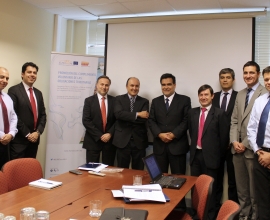EUROsociAL supports Chile in strengthening institutional management in the country's tax agency
Within the framework of the EUROsociAL II Programme, financed by the European Union, an advisory mission was carried out to Chile's Internal Revenue Service (SII), from 22nd to 24th September 2015, to strengthen control of institutional management
As a result of the Chilean tax reform approved by Law 20.780 of September 2014, Chile's SII is currently immersed in a process of transformation and modernisation in order to make a qualitative leap in its performance. These transformations are being driven by legal changes that call for the implementation of the tax reform. In addition, it is responsible for implementing a package of actions and projects defined in the country's 2014-2018 Institutional Strategic Plan.
In addressing these challenges, the SII benefited from the support of EUROsociAL and Spain's State Tax Administration Agency (AEAT). As a first step, in July 2015, an exchange visit by three civil servants from the Office of Planning and Institutional Control of the Projects Office of the SII's Sub-directorate of Studies was organised for the purpose of learning about methodologies and tools for controlling institutional management, as well as the new methodologies and tools for project control being developed by the Spanish tax agency. Among other relevant issues, the visit addressed the following: the process of drawing up the Tax Fraud Prevention Plan; monitoring of compliance with the Tax Fraud Prevention Plan; management indicators and how these are defined in the tax agency; methodological tools used for management control; communication of the strategy, progress and results to the organisation; methods for project control and tracking; and the incentives associated with achieving or meeting targets.
Later, during September's technical assistance mission in Santiago, Chile, the detail of the plans for objectives, methods for controlling results, and the systems for incentivising the achievement of objectives in the Spanish tax agency were explored in greater detail. This included the collaboration of experts from the AEAT's Human Resources Department and Planning and Institutional Relations Office.
The knowledge gained during the two activities will be invaluable for application in the SII, mainly for perfecting the management and project control tools the agency already has. This will make it possible to better carry out activities that involve implementation of the tax reform and the projects in the institutional strategic plan.
This activity is part of the Voluntary Tax Compliance action of the Public Finance area of the EUROsociAL II Programme, financed by the European Union and coordinated by FIIAPP, in which Spain's State Tax Administration Agency (AEAT) and the Inter-American Centre for Tax Administrations (CIAT) are acting as operational partners.
FIIAPP/AEAT/CIAT

